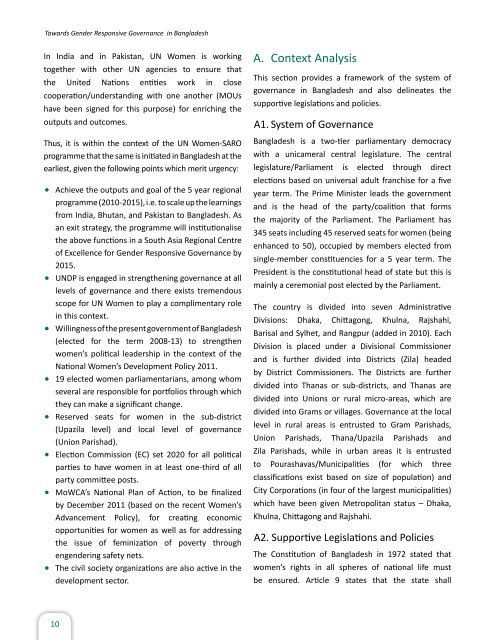A Mapping Study Prepared by Dr. Reena Marwah and Ms. Jeba ...
A Mapping Study Prepared by Dr. Reena Marwah and Ms. Jeba ...
A Mapping Study Prepared by Dr. Reena Marwah and Ms. Jeba ...
You also want an ePaper? Increase the reach of your titles
YUMPU automatically turns print PDFs into web optimized ePapers that Google loves.
Towards Gender Responsive Governance in Bangladesh<br />
In India <strong>and</strong> in Pakistan, UN Women is working<br />
together with other UN agencies to ensure that<br />
the United Nations entities work in close<br />
cooperation/underst<strong>and</strong>ing with one another (MOUs<br />
have been signed for this purpose) for enriching the<br />
outputs <strong>and</strong> outcomes.<br />
Thus, it is within the context of the UN Women-SARO<br />
programme that the same is initiated in Bangladesh at the<br />
earliest, given the following points which merit urgency:<br />
• Achieve the outputs <strong>and</strong> goal of the 5 year regional<br />
programme (2010-2015), i.e. to scale up the learnings<br />
from India, Bhutan, <strong>and</strong> Pakistan to Bangladesh. As<br />
an exit strategy, the programme will institutionalise<br />
the above functions in a South Asia Regional Centre<br />
of Excellence for Gender Responsive Governance <strong>by</strong><br />
2015.<br />
• UNDP is engaged in strengthening governance at all<br />
levels of governance <strong>and</strong> there exists tremendous<br />
scope for UN Women to play a complimentary role<br />
in this context.<br />
• Willingness of the present government of Bangladesh<br />
(elected for the term 2008-13) to strengthen<br />
women’s political leadership in the context of the<br />
National Women’s Development Policy 2011.<br />
• 19 elected women parliamentarians, among whom<br />
several are responsible for portfolios through which<br />
they can make a significant change.<br />
• Reserved seats for women in the sub-district<br />
(Upazila level) <strong>and</strong> local level of governance<br />
(Union Parishad).<br />
• Election Commission (EC) set 2020 for all political<br />
parties to have women in at least one-third of all<br />
party committee posts.<br />
• MoWCA’s National Plan of Action, to be finalized<br />
<strong>by</strong> December 2011 (based on the recent Women’s<br />
Advancement Policy), for creating economic<br />
opportunities for women as well as for addressing<br />
the issue of feminization of poverty through<br />
engendering safety nets.<br />
• The civil society organizations are also active in the<br />
development sector.<br />
10<br />
A. Context Analysis<br />
This section provides a framework of the system of<br />
governance in Bangladesh <strong>and</strong> also delineates the<br />
supportive legislations <strong>and</strong> policies.<br />
A1. System of Governance<br />
Bangladesh is a two-tier parliamentary democracy<br />
with a unicameral central legislature. The central<br />
legislature/Parliament is elected through direct<br />
elections based on universal adult franchise for a five<br />
year term. The Prime Minister leads the government<br />
<strong>and</strong> is the head of the party/coalition that forms<br />
the majority of the Parliament. The Parliament has<br />
345 seats including 45 reserved seats for women (being<br />
enhanced to 50), occupied <strong>by</strong> members elected from<br />
single-member constituencies for a 5 year term. The<br />
President is the constitutional head of state but this is<br />
mainly a ceremonial post elected <strong>by</strong> the Parliament.<br />
The country is divided into seven Administrative<br />
Divisions: Dhaka, Chittagong, Khulna, Rajshahi,<br />
Barisal <strong>and</strong> Sylhet, <strong>and</strong> Rangpur (added in 2010). Each<br />
Division is placed under a Divisional Commissioner<br />
<strong>and</strong> is further divided into Districts (Zila) headed<br />
<strong>by</strong> District Commissioners. The Districts are further<br />
divided into Thanas or sub-districts, <strong>and</strong> Thanas are<br />
divided into Unions or rural micro-areas, which are<br />
divided into Grams or villages. Governance at the local<br />
level in rural areas is entrusted to Gram Parishads,<br />
Union Parishads, Thana/Upazila Parishads <strong>and</strong><br />
Zila Parishads, while in urban areas it is entrusted<br />
to Pourashavas/Municipalities (for which three<br />
classifications exist based on size of population) <strong>and</strong><br />
City Corporations (in four of the largest municipalities)<br />
which have been given Metropolitan status – Dhaka,<br />
Khulna, Chittagong <strong>and</strong> Rajshahi.<br />
A2. Supportive Legislations <strong>and</strong> Policies<br />
The Constitution of Bangladesh in 1972 stated that<br />
women’s rights in all spheres of national life must<br />
be ensured. Article 9 states that the state shall


